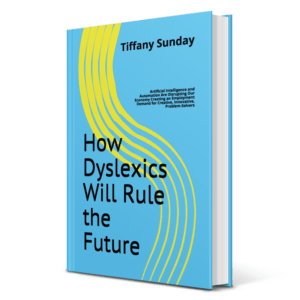Creativity is the Last Competitive Edge Against the Machines
 Artificial intelligence and automation are transforming every aspect of our world. Tiffany Sunday’s, ground-breaking new book, How Dyslexics Will Rule the Future, asserts the last competitive edge against the machines is human creativity.
Artificial intelligence and automation are transforming every aspect of our world. Tiffany Sunday’s, ground-breaking new book, How Dyslexics Will Rule the Future, asserts the last competitive edge against the machines is human creativity.
In the book, Sunday examines the impact of artificial intelligence and automation on employment, the global economy, and society. Sunday condenses research and dozens of interviews into a convincing narrative about the future of work and new job opportunities for creative, problem-solving professionals.
Advanced digital systems and platforms are creating a homogenous mindset. Companies are seeking professionals, who are dyslexic and neurodiverse, to utilize their natural problem-solving, spatial reasoning and pattern finding abilities. Many of the challenges encountered by individuals who think differently are mitigated by software applications and tech devices designed to assist with reading and writing. With all of these advances in technology, bias and obsolete perceptions remain in the workplace.
Sunday challenges readers to embrace a paradigm shift in a new way of thinking about neurodiversity and creativity while shattering the definition of literacy.
Filled with thought-provoking insights about AI and automation, workplace strategies, and lifestyle insights, this book is a must-read for dyslexic professionals, especially HR teams and hiring managers.

 Tiffany Sunday is presenting at the 2018 British Dyslexia Association International Conference in Telford, U.K. on Saturday, April 14, 2018.
Tiffany Sunday is presenting at the 2018 British Dyslexia Association International Conference in Telford, U.K. on Saturday, April 14, 2018. In case you are wondering, this is not a blog post listing the top ten business books to read for the holidays. Nope, this post is different. It’s about the importance of stories and reading.
In case you are wondering, this is not a blog post listing the top ten business books to read for the holidays. Nope, this post is different. It’s about the importance of stories and reading.